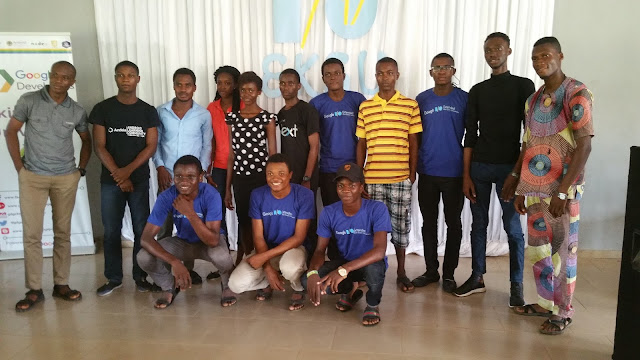Google UX Masterclass 2014: Lessons Learnt.... culled from gdgoau.blogspot.com
“User Experience is everything you need to know,
think about and do to make sure you are launching
the right product for the right people.”
So I got an invite to attend the User Experience Masterclass co-organised by Google and Pan Atlantic University, the parent institution of the Lagos Business School.
 This event as widely announced was initiated to help raise the bar of User Experience Design in Africa. It held in cities across Africa – Nairobi in Kenya, Capetown in South Africa and Lagos in Nigeria.
This event as widely announced was initiated to help raise the bar of User Experience Design in Africa. It held in cities across Africa – Nairobi in Kenya, Capetown in South Africa and Lagos in Nigeria.
The 2-day Lagos edition which I was privileged to be part of was packed with a lot of process-driven activities. Towards having a first-hand understanding as to the concept of User Experience, we were being guided by Matsumi Matsumoto and Ben Davies, the instructors from Google. We learnt about the process of taking an idea from concept to launch including sketching, user testing, prototyping, and the importance of making continuous improvements on products so as to keep our users engaged and satisfied. The duo also took us through the User Experience Process, the Fundamentals of User Experience and the UX Life Cycle, importance of creating personas around an idea and tips on how to conduct user interviews.
Deep into the class, we were split into groups. Each group had to work on a product brief to solve specific problems for a persona that was assigned to that group. The aim was to define product goals meeting the user’s need and the unique features that satisfy the user’s needs. Afterwards, each team made paper based prototypes for the features they considered relevant to their user. Based on these designs, the teams were told to interview people and get their feedback based on their designs. Iterations were then done on the designs. The crux of the event for me was the use of the Balsamiq Mockup tool for interactive wire-framing on which the modified design on paper based prototypes were replicated, making the prototypes more beautiful and realistic.

So many lessons were learnt, but I will highlight a few of them on this post:
- UX is not equal to UI:
This is quite true. The UX process encompasses both the UI process and other things. UX covers research of users’ needs and defining elements of the UI based on the user needs and preferences. UX aims to streamline product features to solve the most cogent needs of the users.
- No more“Code First Ask Questions Later” Approach
Most applications being developed in Africa are built based on this principle whether knowingly or unknowingly. Much effort is given to developing the applications without understanding the needs of the target users. This eventually results in the non-usage of the product by intended users. Applying User Experience Process to application development will help maximize efforts therefore prevents wastage of time and resources.
- Create Personas
A persona is a fictional person that reflects the most important needs and expectations of your target users. Personas are used to identify concepts that matter and create products that match user’s needs.
- User Feedback Is Key:
One of Google’s foremost principle on product design is “focus on the user and all else will follow.” The user’s view is very key to the success of a product. So, a great deal of attention should be paid to the user’s behavior and reactions while using the product.
- It is Better to Fail Early and Recover
Using paper based prototypes and mock-ups, feedback should be gotten from intended users from which iteration can be done. With this there is little or no loss of time and effort even when the idea has to be pivoted.
- Attach no Emotion to Your Idea:
Yes, this is a very crucial point. Most ideators so love and cherish their ideas that they are afraid of feedback from others. This attitude will not help the idea to thrive. One must give room to change and restructuring. The user is the main focus here and sharing idea with them will help to have a broader view as to its viability. Of course no one wants to launch a fantastic product that has no user.
The event ended on a great note, as we were encouraged to spread the word about User Experience in our locality and to build products with great user experience. The UX process could be a rigorous and tasking experience but it is definitely worth it if you intend to give your users the experience they deserve. Yes, I have learnt these lessons and will definitely use it judiciously. I hope you will!!!
H A P P Y U S E R E X P E R I E N C E !!!



Comments
Post a Comment
Thanks for the comment... We'll get back to you soon.
Layray